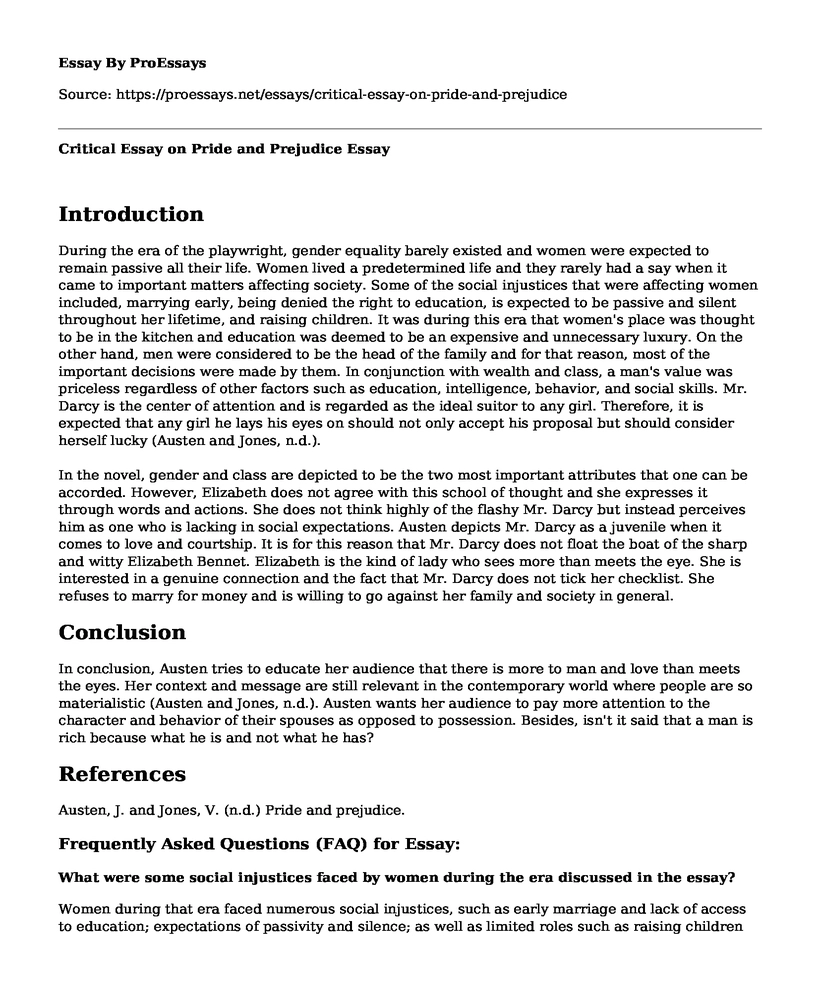Introduction
During the era of the playwright, gender equality barely existed and women were expected to remain passive all their life. Women lived a predetermined life and they rarely had a say when it came to important matters affecting society. Some of the social injustices that were affecting women included, marrying early, being denied the right to education, is expected to be passive and silent throughout her lifetime, and raising children. It was during this era that women's place was thought to be in the kitchen and education was deemed to be an expensive and unnecessary luxury. On the other hand, men were considered to be the head of the family and for that reason, most of the important decisions were made by them. In conjunction with wealth and class, a man's value was priceless regardless of other factors such as education, intelligence, behavior, and social skills. Mr. Darcy is the center of attention and is regarded as the ideal suitor to any girl. Therefore, it is expected that any girl he lays his eyes on should not only accept his proposal but should consider herself lucky (Austen and Jones, n.d.).
In the novel, gender and class are depicted to be the two most important attributes that one can be accorded. However, Elizabeth does not agree with this school of thought and she expresses it through words and actions. She does not think highly of the flashy Mr. Darcy but instead perceives him as one who is lacking in social expectations. Austen depicts Mr. Darcy as a juvenile when it comes to love and courtship. It is for this reason that Mr. Darcy does not float the boat of the sharp and witty Elizabeth Bennet. Elizabeth is the kind of lady who sees more than meets the eye. She is interested in a genuine connection and the fact that Mr. Darcy does not tick her checklist. She refuses to marry for money and is willing to go against her family and society in general.
Conclusion
In conclusion, Austen tries to educate her audience that there is more to man and love than meets the eyes. Her context and message are still relevant in the contemporary world where people are so materialistic (Austen and Jones, n.d.). Austen wants her audience to pay more attention to the character and behavior of their spouses as opposed to possession. Besides, isn't it said that a man is rich because what he is and not what he has?
References
Austen, J. and Jones, V. (n.d.) Pride and prejudice.
Cite this page
Critical Essay on Pride and Prejudice. (2022, Mar 30). Retrieved from https://proessays.net/essays/critical-essay-on-pride-and-prejudice
If you are the original author of this essay and no longer wish to have it published on the ProEssays website, please click below to request its removal:
- Kollontai's 'Sisters' - Literature Analysis Essay
- An Analysis Essay on Robert Browning's "My Last Duchess"
- Anthem - Literary Analysis Essay
- Paper Example on Rousseau's Ideas Impact French Revolution: Declaration of Rights of Man
- Established Genres: A Reflection of Life Experiences - Essay Example
- Essay Example on A House in the Bamboo: Wang Wei's Chinese Tang Poem
- Essay on Insights and Epiphanies: Understanding the Narrator's Transformation in 'Cathedral'







